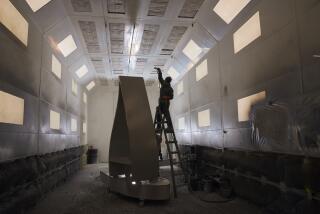These Job Fairs Help Clean Air : Pollution: A handful of companies are specializing in matching employers with engineers and consultants in the environmental industry.
- Share via
Christos Richards used to help recruit engineers for big aerospace companies that also happened to be big polluters. Now some of those same companies are turning to Richards for new engineering talent to clean up the mess.
Richards, 33, is co-owner and executive vice president of Career Connection, a tiny Thousand Oaks firm that puts on job fairs exclusively for environmental engineers and consultants. Richards and his partner, Stephen P. Aeby, switched to hosting environmental job fairs a year ago after a slowdown in defense spending cut demand for aerospace engineers.
The company opened for business last fall and hosted its eighth job fair this past weekend. Revenues are still modest--this year Richards expects to gross $500,000--but analysts say its mere existence is an indication of how far the once obscure environmental industry has come, thanks to tough anti-pollution laws.
“It’s a good sign of the times that there’s more work,” said Grant Ferrier, editor of the Environmental Business Journal, a San Diego trade publication that follows the industry. “The environmental field really has started to come of age in the last two years. It’s taken much more seriously by the generators” of pollution.
Career Connection, which has seven employees, is one of a handful of companies that specialize in bringing together employers and job-seekers in the environmental industry. Another such firm is Environmental Careers Bulletin in West Los Angeles, which is hosting job fairs this summer in Torrance and San Rafael.
Job candidates attend the fairs for free, and employers pay Career Connection about $2,700 each for the right to conduct job interviews in a hotel suite. In return, Career Connection advertises upcoming fairs in trade publications and local newspapers, rents hotel space and interviews job-seekers to make sure they have the right qualifications.
About two-thirds of those who call Career Connection wanting to attend a fair are turned away by Richards. The rest are sent invitations, which must be presented at the door for admittance, and their names are sent to employers several weeks in advance. Also, several hundred job-seekers typically show up without invitations, but their resumes must first be screened by Career Connection staff members before they can be admitted.
So far, the formula appears to be working, Richards said. The job fair last weekend in Los Angeles attracted 18 employers--a record for the company--and 630 job-seekers. Richards had hoped that at least 800 people would attend, but jitters prompted by Friday’s earthquake apparently scared off some out-of-town applicants, Aeby said. Career Connection’s first environmental fair in September attracted nine employers and 530 job applicants, Richards said.
Employers average two to three hires per fair, so they spend as little as $1,000 on an applicant compared with the industry average of $10,000 to $15,000 per job search, he said. Also, employers have a better chance of finding qualified applicants because only people with environmental credentials are allowed to attend (other fairs include environmental careers along with a variety of other technical specialties).
“I wouldn’t participate in any other kind of job fair,” said Lloyd Brown, staffing manager for CH2M Hill, a Denver environmental consulting firm that has recruited at two Career Connection fairs.
Still, only 20 of 600 people who attended a Career Connection job fair in New Jersey last year met CH2M Hill’s qualifications, Brown said. Of those, the company interviewed three at its Denver offices, but none were offered jobs because of a subsequent hiring freeze, he said.
Brown said he anticipates better results in the future. “They are getting better at screening and directing people at the firms that would be most likely to hire them,” he said.
Among companies that have participated in the fairs are big names such as Northrop, TRW, Rockwell International and Battelle Pacific Northwest Laboratories, a Richland, Wash., environmental consulting company. The U.S. Army Corps of Engineers and the Metropolitan Water District also have attended.
Particularly in demand are engineers with expertise in air quality management and testing and cleaning of contaminated ground water--areas that have mushroomed as federal and local authorities have cracked down on polluters.
“We’re all looking for the same people because the same regulations are driving the industry,” said Richard M. Tinlin, a recruiter for Geraghty & Miller Inc., a Plainview, N.Y., environmental consulting firm that rented a suite at last weekend’s job fair.
Steven G. Sloma went to Career Connection’s job fair last weekend looking for an environmental consulting job, and is typical of the new breed of environmental job-seekers. A chemical engineer for 25 years, he was laid off from British Petroleum Corp. in May because the company cut back on production of exotic plastics used by the aerospace industry. Demand for the compounds plunged after the Navy canceled the A-12 stealth attack-jet program and Congress cut back the B-2 Stealth bomber program.
Sloma, who also has a law degree, said, “All of my degrees and experience are needed in this industry. I consider this a phenomenal opportunity.”
Not so typical was a group of six engineers and scientists who had recently emigrated from the Soviet Union and Romania. One of them, Irina Samofalova, left her job as a chemical engineer with a Moscow research lab a year ago and moved to the United States under a program that helps resettle Soviet Jews. “I’m here looking for a job in the same field as I had in Russia,” she said.
Richards said Career Connection needs to attract ten to 12 companies per fair to break even. If it reaches its revenue goal of $500,000 this year, it will make a profit of $50,000 to $75,000.
Whether or not Richards’ company survives, at least he’s competing in an industry that’s growing fast. Nationally, revenues for environmental products and services reached $132 billion in 1990, a 12% jump over the $120 billion reported in 1989, according to a survey by the Environmental Business Journal. This year, revenues are expected to climb another 11%.
Brown of CH2M Hill estimates that the environmental industry employs about 400,000 people, spread across fields such as waste disposal, consulting, testing and equipment manufacturing.
Tough environmental laws such as the federal Clean Water Act, the Clean Air Act, the Superfund Act and myriad state and local regulations have given polluters no choice but to clean up. Many companies, Ferrier said, have voluntarily adopted environmental safeguards to avoid getting into trouble with the government.
Other companies, Ferrier said, have learned that they can save money by converting to cleaner manufacturing processes.
“They realize that it’s not just a political issue that is going to go away, but that it’s a sincere cost of doing business,” Ferrier said. “It’s something to plan for in the future instead of waiting for the next law to come out and comply with it.”
Career Connection was formed in 1989 as an outgrowth of a company run by Richards that specialized in recruiting technical specialists for defense contractors. Richards started the first company in 1987 after leaving another employment consulting firm in Westlake Village. He hired Aeby as an account executive and later the two became partners in Career Connection.
At the same time that aerospace firms began cutting back, Richards and Aeby noticed a surge in help-wanted ads for environmental specialists. So they decided to focus almost exclusively on the environmental industry.
“We had to change our focus,” Richards said, “or we would have been out of business.”
More to Read
Inside the business of entertainment
The Wide Shot brings you news, analysis and insights on everything from streaming wars to production — and what it all means for the future.
You may occasionally receive promotional content from the Los Angeles Times.










